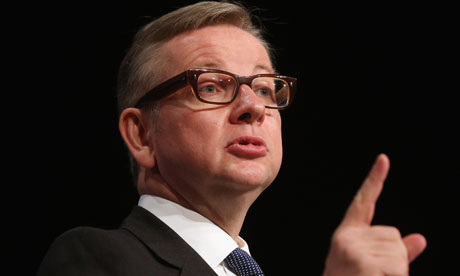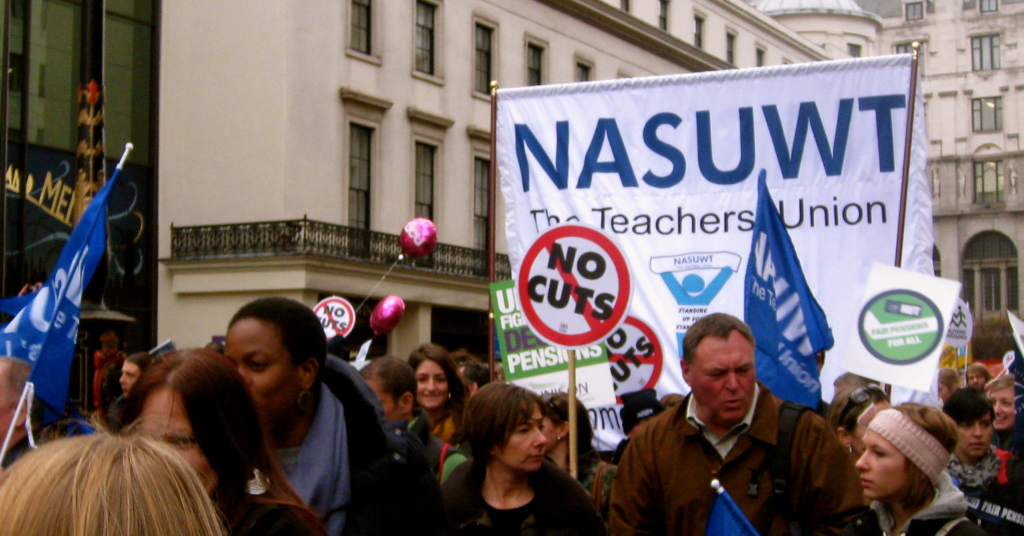Michael Gove: Letting the Whole School Down

What’s the difference between Michael Gove and a plastic surgeon? A plastic surgeon tucks features, but Gove…
For a while, Michael Gove was one of the coalition government’s biggest jokes. Between the vanity projects, the prat-falls, and his Pob-like features, it’s easy to see why he’s the target of satire, but those who laugh at the Education Secretary risk seriously underestimating him. While Gove is wrong about a lot of things, he’s not stupid; he knows exactly what he’s doing, which is taking apart the state education system so that it can be re-made in the Tory image. And one of the fundamental parts of this plan involves discrediting the very people who have the knowledge to put up any real opposition: teachers.
It all started around the time of the 2011 strikes. Not just with the increased retirement age and decreased pension that gave public sector workers legal grounds to call a strike, but with Gove’s response to the them. In order to minimise the disruption to working parents, Gove suggested that volunteers should take over in classrooms for the day. He followed this up by allowing first free schools, and then academies, to employ people without a formal teaching qualification to work as teachers.
Most of us appreciate that teaching is not an easy job (and having dropped out of a PGCE, I’d be one of the first to admit that it’s bloody difficult), but what a lot of people don’t realise is that teaching is intensely theoretical. Yes, teachers need a certain set of soft skills as well, but the theory is hugely important. As well as knowing what to teach, teachers need to know how to teach it; and although an unqualified teacher might eventually figure it out, what happens to the kids they teach in the meantime? And the colleagues who have to spend extra time coaching them through the basics?
What Gove is trying to do here is undermine the idea that teachers are specialised professionals. It sounds like a counterproductive thing for an Education Secretary to do, but it’s tactical move because teachers and education academics are the people who have the training, knowledge, and evidence to show why Gove’s plans are ridiculously impractical. This gives them an advantage over him, which he’d trying to chip away at by constantly suggesting that they aren’t knowledgeable, or that their knowledge isn’t important, making himself appear more credible in comparison.
The current retro theme in Tory education policy of putting “rigour” back into the school curriculum is just another way of manipulating the public perception of teaching, reducing a teacher’s role to simply standing at the front of the classroom imparting facts. It’s a style of teaching that was common back in the days when you didn’t need any special training to work in education, and there are solid, evidence-based reasons why most of these methods have fallen out of use. They might work quite well for the bright, able kids who arrive at school ready to absorb whatever they are presented with, but in real world not all kids are like that – certainly not to begin with, anyway.
There are many reasons why Finland – which has arguably the best education system in the world – gets such good results, but one of the things that contributes to that success is having teachers who are all educated to Masters level. However, Gove seems to think that England’s teachers can do without the training if they just make the kids do their sums in Roman numerals and use the subjunctive twice a week. You can’t improve results by simply telling teachers that they must do better; they need to have tools like evidence-based practice and comprehensive training to do their jobs properly.
The next few years promise to be difficult for teachers, and the NUT are describing strike action as “inevitable”. Amongst the current issues is a decision to change the Ofsted inspection category of “satisfactory” to “requires improvement”. This will make previously acceptable schools, and by extension teachers, look as if they are failing. We could see more schools like Downhills Primary (which, although labelled as a “failing school” had test results above the minimum acceptable level set by the goverment) being turned over to academy chains run by Tory donors, against the wishes of their local communities.
As the government’s austerity agenda continues to push more families into financial hardship, more children will have to live in homes that are cold and never have quite enough food, and it won’t be social conditions that take the blame for their declining performance at school. And while social and economic circumstances make teaching more difficult than it needs to be, the Department of Education will take full advantage of the opportunity to throw teachers under the school bus.




LOOOOOOOOOOOOOOOOOOOOOOOOOOOOOOOOOOOOOOOOOOOOOOOL
Acanthium – Who says a school can only be good at one thing? Why should parents have to choose between a school with a good science department and a good history department, or between sports facilities and music facilities? And what happens if the child – I noticed that children’s needs are secondary to the parent’s desires in your argument – grows up with no interest in and/or aptitude for the specialist subject their parents chose for them at age 11? How much of a disadvantage will children without well-educated, pushy, middle-class parents be placed at because nobody thought to put them forward for one of these extra-special schools?
I’m not saying that all schools should be mediocre; they should all be good, but none of them should put children into educational pigeon-holes. Imagine that you were a teenager who had discovered that there was one thing above all others that you enjoyed and were good at, but your school didn’t rate it as important and put the bare minimum of resources into it.
Teachers may be expert in how to teach, but they don’t necessarily know what to teach. Numerate parents may want a science-based curriculum for their children, historically-minded parents may prefer one that offers Latin and Ancient Greek. Sporty parents might seek a school with great sports facilities. Typical state schools don’t tend to offer these choices, so extra school options seem to be a good development. It is hard to see why the NUT seem to oppose giving parents and students these kind of choices. Specialised schools will still need teachers!
As a teacher of many years standing and although I hate Gove to my core, the current system of GCSEs is corrupt beyond belief. The exams in Maths, English and Science are many times easier than those of 20 to 30 years ago, despite what some will tell you and – if you don’t believe me then just get the papers and do them for yourself.
‘Cheating’ on assessed coursework and controlled assessments etc is ingrained, exam marking (which I have done for several years) is also dodgy with way too much flexibility in the pathetic mark schemes provided. The things clearly need addressing. Surely it would be better to keep the courses but up the standards and introduce more useful vocational-type qualifications for pupils who wish to follow trades or pursue a less purely academic path?
And exam boards should not be profit-making entities – that has led the rush to the bottom with ever easier courses and exams produced
Acanthium – while parents may know their own children, they don’t necessarily know much about education. “Choice” generally isn’t an element of high-performing education systems, and when free schools were introduced in Sweden standards were actually lowered. Parental choice can sometimes come down to little more than thinly-veiled snobbery about the kind of children they want their own offspring to mix with.
Teachers work hard and have important views. When teachers’ views differ from parents’ views, though, I tend to support the parents as they know their children better than the teachers do. Many parents support the academies and free schools, so perhaps there is room for many different types of school so parents can choose what is best for their own children. The NUT sometimes seems to prioritise teacher interests over the interests of children.
Forced academies in primary schools are taking off – but so are parental and community campaigns in defence of their schools. Latest are Roke Primary in Croydon and Gladstone Park Primary in Brent.
More on: http://wembleymatters.blogspot.co.uk/2013/01/brent-school-wars-intensify.html